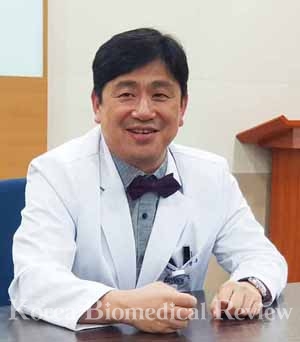“I came here to turn this hospital into a Korean version of Mayo Clinic, providing patient-centered care.”
So said Kim Jin-goo, who took office as the sixth president of Myongji Hospital, at a news conference on Wednesday.
Kim is a renowned specialist in sports medicine in Korea. A graduate of Seoul National University College of Medicine, he previously served as the vice president of Inje University Seoul Paik Hospital and head of Sports Medicine Center at Konkuk University Medical Center.

Kim said he chose to lead Myongji Hospital to realize his dream of “making another Mayo Clinic in Korea.”
“I thought that Korea needs a hospital which can actively predict a future in the era of the Fourth Industrial Revolution and puts top priority on patient care at the same time,” Kim said.
For a hospital under the Fourth Industrial Revolution, “patient-first policy” is the key, the new head of Myongjin Hospital said. Advancing technologies such as artificial intelligence will prompt hospitals and physicians to visit patients, and this will require hospitals to play a different role, he added.
Kim emphasized that every individual staff of Myongji Hospital have to care for patients with pride that they are the best professionals and listen to each patient carefully. He took the example of an employee at Mayo Clinic.
“We commonly see a tripod warning a slippery floor, but it was a cleaning staff at Mayo Clinic who first came up with the idea. A small act for patient safety has become a familiar scene at hospitals in general,” he said. “Myongji Hospital will be the first in Korea to put the patient-first policy into practice.”
Myongji Hospital joined the Mayo Clinic Care Network (MCCN) last year, allowing patients to receive Mayo’s various medical care services without extra payment.
Mayo Clinic is the world’s first and largest non-profit medical institution. With a history of longer than 150 years, the hospital has developed medical knowledge through research and education in all fields. Over 4,000 physicians and scholars and 60,000 staff members work at Mayo Clinic campuses in Minnesota, Florida, and Arizona to provide healthcare services for 1.3 million patients a year. The hospital reinvests all of its profits in care improvement, research, and education.
Some critics say Myongji Hospital borrowed the name of Mayo Clinic.
However, Kim said it was not true.
He noted that if Myongji Hospital requests Mayo’s consulting on a particular patient, Mayo’s experts will discuss diagnosis and treatment and send the result back to Myongji.
“As Korea and the U.S. have different medical care systems, medications can be different, too. That is why Myongji Hospital is looking for ways to apply Mayo’s system to a Korean medical system,” he said.
Myongji’s collaboration with Mayo Clinic will not be confined to patient care only, Kim noted. The cooperation is comprehensive, covering as far as the hospital management system, he said.
The result of collaborative work between Myongji and Mayo Clinic will come out in March or April next year, he added.
(Caption)
Kim Jin-goo, the new president of Myongji Hospital, speaks at a news conference at the hospital in Goyang, Gyeonggi Province, on Wednesday.

